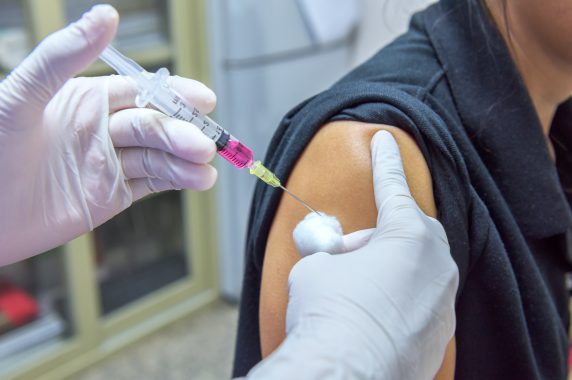Covid vaccines are 74% effective in the immunosuppressed after a second dose is given, Public Health England (PHE) has announced.
This rises from 4% effectiveness after the first dose, it added.
It comes as the health secretary this week urged immunosuppressed patients to contact their GP about additional precautions to protect themselves from coronavirus, in anticipation of Covid restrictions ending later this month.
New PHE data has today shown that Covid vaccines are ‘highly effective’ in the clinical risk groups, including the immunosuppressed.
PHE said the vaccines used in the UK are ‘as effective at preventing symptomatic disease in the majority of people with underlying health conditions compared to the rest of the population’.
A not-yet-peer-reviewed study, published as a preprint, found that ‘overall vaccine effectiveness against symptomatic disease in risk groups is approximately 60% after one dose of either AstraZeneca or Pfizer-BioNTech, with little variation by age’, PHE said.
It added that the study, which included more than one million people in at-risk groups, also found that ‘for those who are immunosuppressed, vaccine effectiveness after a second dose is 74%, with similar protection to those who are not in a risk group’ – rising from 4% after a first dose.
For the AstraZeneca vaccine, effectiveness after two doses in the 16-64s in at-risk groups is 81%, but ‘no data is available’ for the Pfizer vaccine, it said.
In the over-65s in at-risk groups, vaccine effectiveness was 89% with the Pfizer jab and 80% with AstraZeneca, it added.
PHE said that ‘everyone in these groups should now have been offered a second dose’, after second doses were brought forward from 12 weeks to eight for the clinically vulnerable in May.
It added that while ‘more data is needed’, protection against hospitalisation and death in at-risk groups is ‘expected to be greater than protection against symptomatic disease’, in line with the general population.
PHE head of immunisation Dr Mary Ramsay said: ‘This real-world data shows for the first time that most people who are clinically vulnerable to Covid-19 still receive high levels of protection after two doses of vaccine.
‘It is vital that anyone with an underlying condition gets both doses, especially people with weakened immune systems as they gain so much more benefit from the second dose.’
If the planned booster programme goes ahead from September, the JCVI has recommended that the clinically extremely vulnerable and the immunosuppressed should be one of the first priority groups in the two-stage programme.
The household contacts of the immunosuppressed are recommended for inclusion in stage two of the booster programme.
The Department of Health and Social Care (DHSC) has said that guidance for clinically extremely vulnerable patients – who were told to shield during the height of the pandemic – will be updated before 19 July, if the Government decides to go ahead with lifting restrictions at that point.
More to follow
This article was updated at 15:50 on 09/07/21 to include corrected PHE data on vaccine effectiveness in the 16-64s and over-65s in at-risk groups.


















READERS' COMMENTS [4]
Please note, only GPs are permitted to add comments to articles
I am afraid will all be a “dog-eat-dog” world now. Real shame.
Hunting through to find some evidence in the paper that they have somehow adjusted for significant reduction of exposure to the virus in the “real world” by shielding… This should be a huge caveat to measuring case numbers of infection in this population. I hope they don’t use this headline to justify lack of further mitigation for this group of vulnerable patients in the face of the delta wave. Needs serious peer review and careful application.
All the percentages are Relative Risk Reductions not Absolute Risk Reductions – and if these figures (percentages) are Trial numbers, the word is ‘efficacy’, not ‘effectiveness’.
Are these reporting differences meant to mislead?
Severe disease (ie Covid-19) is a phenomenon of immune hyperactivity (a cytokine storm) so it is not surprising that immunosuppressed patients are less likely to get it. This was noted some while back in patients with rheumatoid arthritis on biologics, which suppress cytokines (Il-1, Il-6 and TNF-alpha). Whether this has been thought of in this latest study is not clear.